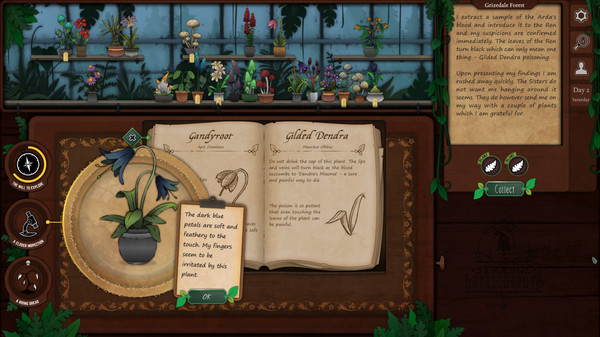Over the past weekend, I had my first moment of natural bliss with my Steam Deck. I was sitting around bored on a Saturday and remembered that I’d been meaning to play Strange Horticulture, an murder-mystery game about running a plant shop. The only problem is that it’s exclusive to PC at the moment and I simply wanted to lay on my couch and relax. That’s when I remembered I now had a Steam Deck.
I booted the system up and found the game on the Steam store, keeping my fingers crossed that it had been verified for the device. Sure enough, I found some friendly green text on the game’s store page, letting me know it would work just fine as a handheld game. I was ecstatic as I bought the game on the device itself and cozied up on my couch as it downloaded. What a future I was living in!
Unfortunately, my utopian gaming moment quickly got a dose of reality. While the game ran smoothly on Steam Deck, it certainly hadn’t been optimized for it. That made me realize that Valve’s game verification process might not be as useful as it seems yet.
A strange process
In Strange Horticulture, players run a plant shop while trying to solve an occult mystery. The core gameplay loop is that customers request specific plants and players need to correctly identify it from rows of unlabeled plants. To do so, they’ll have a few tools, like a plant guide with a page detailing each one’s properties. Once a plant has been identified correctly, players can attach a label to it and type in the correct name. On top of all that, there’s a puzzle element where players find locations on a map using a set of letters and clues they receive through the game.
It’s a fantastic deduction game, but one I wish I hadn’t played on Steam Deck. The text is ridiculously tiny across the board when viewed on a s7-inch screen. I had to squint to see location names on the map or read tiny dialogue options. The Steam Deck’s keyboard is so cumbersome that typing out plant names took three times as long on the handheld as it would have on a PC. Luckily, the game features an “auto-label” option, though using it takes away some of the satisfaction and limits how players can create labels.

It’s clear that the game hasn’t been optimized for Steam Deck, but what baffles me is why it received verified status while some other games I’ve played have a second-tier “playable” label instead. Shadow of the Tomb Raider runs especially smooth on the device. It aced its benchmark test when I ran it and was generally a natural experience in handheld mode. Even so, it has a yellow label indicating that the game will work on the device, but may need some workarounds.
When I expand the compatibility details, I’m told the game requires use of a keyboard if I want to log into my Square Enix account. That’s more or less the only knock against it. Another note says that the game “displays compatibility warnings when running on Steam Deck, but runs fine,” which doesn’t seem like much of an issue compared to some of the issues I bumped up against in Strange Horticulture. I’m especially puzzled as to why using a keyboard to sign in to an account is a problem, but using it as a core tool in another game is fine.

I’ve noticed lots of little inconsistencies with the process during my time with the device. Dicey Dungeons is perhaps the best game I’ve played on the Steam Deck in terms of how naturally it translates to a touchscreen, but it isn’t verified. A yellow note tells me it displays some PC interface during the game, but the only “issue” I see is that a small mouse appears on screen when using the touchpad. The bar seems to be a movimg target from game to game.
I understand why that would be the case. Valve has the not-so-simple task of testing an impossible number of games on its device. Naturally, its going to take time to get the process right. I just hope it evolves quickly, because I’m already feeling skittish about buying games with the intention of playing them on a portable. Even if they’re verified, they might not be an ideal experience.



